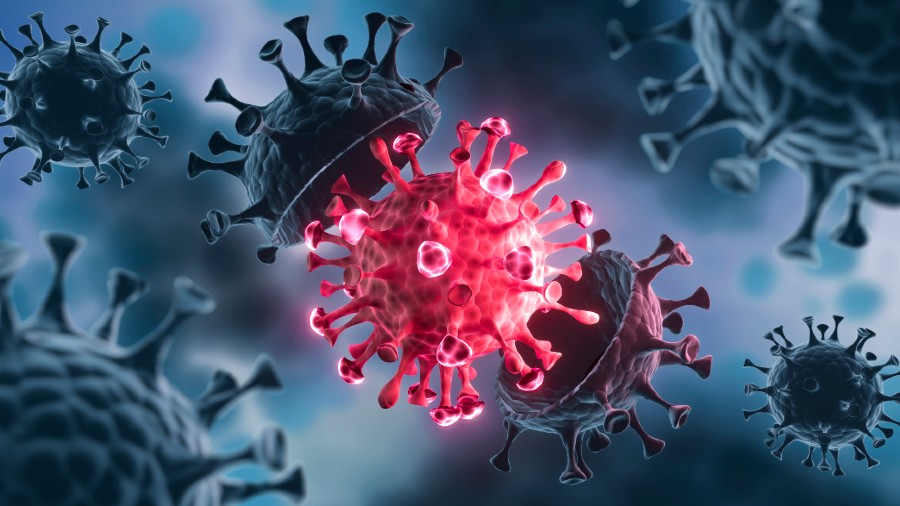Scientists at Pune's National Institute of Virology have isolated and characterised a coronavirus variant from two travellers -- one who returned from the UK and the other from Brazil -- that exhibits increased disease severity in hamsters but doesn't pose a public health problem at the moment.
The two samples of the B.1.1.28.2 variant are the only ones of its kind isolated by Indian labs so far.
The variant was isolated from nasal/throat swabs from a traveller who returned to India from the UK in December 2020, and another who came back from Brazil in January 2021.
The samples of the variant, first identified in Brazil last year, were collected as part of the ongoing SARS-CoV-2 genomic surveillance.
The finding is significant since the variant is classified as a variant of interest by the World Health Organization, said study lead author Pragya Yadav from ICMR-NIV Pune.
“We also observed an increased disease severity and neutralisation reduction in the study which point towards the need for screening the current vaccines for efficacy,” Yadav told PTI.
To understand the pathogenicity of the variant, researchers infected nine Syrian hamsters with the B.1.1.28.2 variant and compared it to nine animals infected with the B.1 variant, which is defined by one mutation of concern in spike protein, i.e D614G.
Spike protein helps the virus to infect and enter human cells.
The authors of the yet-to-be-published study, posted on the preprint repository BioRxiv on May 24, noted that B.1.1.28.2 induced body weight loss, viral reproduction in the respiratory tract, lung lesions, and caused severe lung disease in the infected hamsters in comparison with those infected with the B.1 variant.
The blood plasma isolated from hamsters infected with the B.1.1.28.2 variant of coronavirus efficiently neutralised the B.1 variant.
However, a six-fold reduction in the antibody neutralisation was seen in case of blood serum isolated from the B.1 mutant infected hamsters on the B.1.1.28.2 coronavirus variant.
Antibody neutralisation renders the virus no longer infectious or pathogenic.
A mutation means a change in a nucleic acid base or amino acid molecule, and a virus containing this change is termed a mutant.
Mutations eventually accumulate to generate variants that differ from the original virus more and more, and so, a variant can have limited or even cumulative mutations, Yadav explained.
The findings of increased disease severity and antibody neutralisation reduction is of great concern and point towards the need for screening the current vaccines for efficacy, the researchers noted in the paper.
Yadav said the variant has shown potential reduction in neutralisation by some monoclonal antibody treatments and reduced neutralisation by post-vaccination blood serum from some mRNA vaccines.
While RNA is the genetic material of the coronavirus, messenger RNA or mRNA vaccines teach our cells how to make a protein or a part of it that triggers an immune response inside our bodies.
Monoclonal antibody therapy uses lab-made antibodies to treat Covid-19 in patients at high risk for developing severe illness.
According to Yadav, the variant at the moment does not pose a public health problem for the country.
She said the research team had performed another study in April to assess the neutralisation potential of the blood serum from natural SARS-CoV-2 infected individuals and recipients of the Covaxin Covid-19 vaccine developed by the Hyderabad based Bharat Biotech.
She said the two-dose inactivated virus vaccine significantly neutralised the B.1.1.28.2 variant, adding, therefore, that immunisation should protect individuals against it.
Over the year of the Covid-19 pandemic, Severe Acute Respiratory Syndrome Corona virus-2 (SARS-CoV-2) has accumulated severe mutations leading to the emergence of new variants.
The first SARS-CoV-2 variant of concern, B.1.1.7 was identified in late December in the UK which is now reported in more than 62 countries.
The recent emergence of B.1.617.1 and B.1.617.2 has caused concern in India, with some blaming the variants for the devastating second wave in the country.
Yadav said active epidemiological surveillance is ongoing in India with the partnership of multiple agencies and the country is capable of detecting any warning signals in time to alert the concerned authorities.










